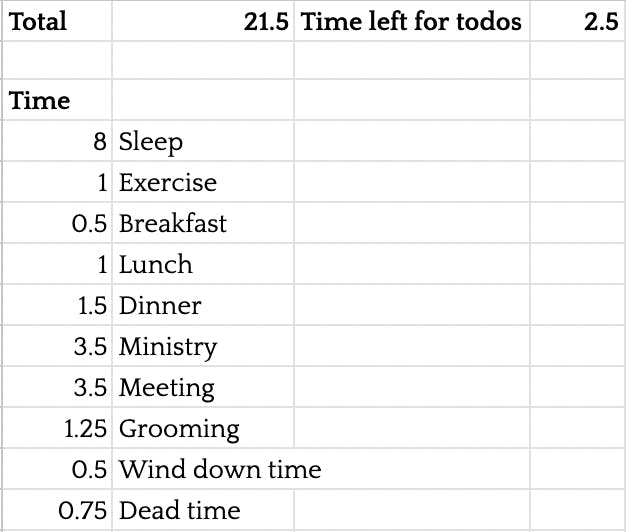TLDR = todo-time + a todo list.
That's it.
Time blocking might work for you. That's great, genuinely. If it doesn't, here's my alternative.
Firstly, why do I care about this?
I'm going to deviate a little bit from talking about software engineering. It's how I manage my time and get things done inside and outside of work. At least, I've been doing this since September 2023.
This may change, but for now, I'm railing against the idea that productivity requires time-blocking.
I also note, that my aim is to reduce stress while achieving my goals, and for the first time, I'm managing to inch towards things I've been dreaming about for years, like moving to another country, and doing so without trying to skimp on sleep and relaxation.
I actively avoid time-blocking as much as I can.
Natural time-blocks are necessary
While I try to avoid time-blocking unnecessarily, I'd be delusional to say that it's not needed. It's absolutely essential.
Time blocks are a natural part of life.
Anytime we need to be somewhere at the same time as someone else, that's a time block.
Think lectures at school.
Think about being at work, whether remote or in the office.
Think about synchronous meetings.
Think about weddings, funerals, the World Cup and meals with friends.
Think about sleep, even.
If you want to enjoy life in real-time with others; time block.
If it's just you doing work, by yourself, why time block?
Natural time blocks aren't bad. They're about congregating people around an event at a specific time.
The event starts. The event ends. The time is done.
But if it's just me working, what am I time-blocking for?
What do I mean by the time blocking?
So something else I need to clarify is what I mean by time blocking.
I don't just mean, setting a generic block of time in which to do anything. I mean, time-blocking to achieve a certain thing.
For example:

Now this has a lot of things going for it:
It looks very organised.
It's obvious what I'm supposed to be working on and when.
There is a clear structure to my day.
But there are a few problems with this.
Stress!
It assumes I can complete certain tasks by a certain time.
It assumes I won't be required at several points in the day to assist team members and customers with their queries.
It assumes my meeting will only last 30 minutes.
It assumes that I can't finish my task way within time and move on to something else.
It assumes I'm mentally and physically ready and optimised to work on those tasks at those times.
So let me go into those problems a little more.
Time blocks aren't flexible enough to work with my changes in energy
Time blocking just doesn't allow for the ebbs and flows of the day.
Everyone's day in many ways is the same. Yet, we're all different.
Sometimes I'm full of energy first thing. Other times I'm groggy. I might want a light and simple set of todos to get going. I might be ready to get my head down and tackle something hard that's been on my mind from the night before.
But time blocks are just too inflexible to take advantage of this natural ebb and flow of energy. It doesn't care if you're optimised to deliver 100% creative performance now. You have to wait for that time-block later.
An example from Mohammed Ali
Now this seems like a deviation from time blocks, but it's a good reminder for me. When asked about how many push-ups he could do, see his answer below (or here if the embed doesn't work):
Notice, he only started counting the push-ups when they began to hurt.
It reminds me of non-personalised training advice. You see, some may say, do 2 minutes of running followed by 1 minute of walking, and repeat for 30 minutes and then increase running time until you get good at it. But what if that's too hard to start at that point? What if that's too easy? Who knows.
Another trainer instead, may check your heart rate has reached a certain maximum, then he'll make you walk until it you heart rate is steady at a certain level again. Your recovery rate might be 1 minute, it might be 15 minutes. But it's based on your energy levels and recovery rate, and not just blocks of time.
Time blocks cause unnecessary stress
Deadlines cause stress.
If a deadline is from a customer, from investors, from the tax man, from our boss, fair enough, deadlines are inevitable. Stress is also good for growth. A little bit of stress during exercise makes us fitter and stronger. But stress isn't great for our health when it's chronic.
We've heard people say "I need to have a car by the time I'm 18." I need to be earning $1,000,000 by the time I'm 30. I need to own my house by the time I'm 35! Self-imposed deadlines cause stress. I need to fit into that dress before the wedding! It can be a great motivator for the big things.
But why increment unnecessary stress throughout your day, weeks and years for little tiny tasks you won't even remember tomorrow, minute by minute, and hour by hour?
If I've said, between 10:00-12:00, I do task A, then from 12:00-14:00, I do task B, what happens when it's 12:00, and I haven't finished task A? Stress!
You could say, well, maybe just work faster.
But what does faster mean?
Do I need to? Is there a deadline? Do I want to do a shoddy job? Do I want to cut corners? Is it not important, so it doesn't matter if the quality is not good or not? Do I just deliver part of the work and be done with it?
Sometimes deadlines are important, but if the work needs to be done, and it needs to be done.
Time blocks add stress. Why not just not time block?
Other people say so too:
Time blocks limit creativity
For knowledge work, it limits our creativity. Not every piece of work needs a genius idea. A lot of work is a matter of just getting things done. But sometimes, you need that spark of imagination.
For example, maybe you've heard this quote:
It's not that I'm so smart, it's just that I stay with problems longer. - Albert Einstein
Time-blocking a task to get something done that you may not be able to achieve in that time, will limit creativity. Instead of trying to imagine a solution, I'll be scouring the internet for someone who has already solved my problem.
Unless the time-block is to come up with ideas, and not complete the work, time-blocks do not help me here.
Also, when my mind is fixated on a problem, I can't time-block my imagination. My brain just keeps going back to it. I've learned not to time-block that either.
I'm a software engineer, and estimating is really hard.
Take my example of having task A between 10:00-12:00 and task B between 12:00-14:00.
What happens if I finish task A by 10:05?
Do I do nothing for almost 2 hours? Do I start on task B instead? Then do I finish the day early? Maybe.
Again, time blocks require great estimates. Rarely is it easy to estimate so accurately about getting things done. Hopefully, our estimates aren't completely off but rarely are they accurate.
I need a break from working on something big
And that big thing, even when broken down into smaller things can take days or longer. I can't just throw myself at it for days at a time. I want little breaks in between, and so smaller todos make for little productive breaks rather than stopping work completely.
For example, something simple, like when writing this article, I reached a point where I wanted a break. So I had a small to-do, which was to cross-post another article elsewhere. I also needed to go through my todos as a whole and reprioritise them. 20 minutes later, I was ready to start back on this again.
Slowing down for more meaningful work
Ecclesiastes 3:1-11 NIV
There is a time for everything, and a season for every activity under the heavens...He has made everything beautiful in its time.
Time blocks don't care about the natural speed at which we do things.
But going slower, not so slow as to procrastinate and waste time, but slower to do something properly, not rushing, means having more pride in my work. If I rush, I do a bad job. We all do. Now there's a difference between been naturally fast, and rushing. Time blocks do not allow for that extra time to polish unless you time-block it in. I'd rather just do the thing, rather than having to plan to do the thing.
So what's my alternative?
A. I need to know how much available time I have for todos.
Here's an example of my Tuesday (which is my day off paid work where I volunteer instead). Anything that's not dead time (0.75 hours for transitioning between tasks) or isn't a non-negotiable activity eg. sleep, grooming or eating, gives me time for my Todos.

And that's it, at best, I'll have 2.5 hours for todos unless I'm happy to skimp on time spent elsewhere. If I plan a social, that will eat into my todo-time. If I decide to relax and just watch YouTube, that'll also eat into my todo-time.
But knowing I have 2.5 hours maximum of todo-time gives me a realistic view of what I can achieve and get done. Over a period of weeks and months, 2.5 hours every Tuesday will add up. But on its own, I'll only achieve so much.
B. Having a list of todos
Just having a list of todos, ideally categorised in some cognitively contextual way is more than all I need to be productive. For example, here are the highest priority todos on my list for today:

If they're not important to me, they shouldn't be on my todo-list or at least, they shouldn't be high priority on my todo-list either.
C. Prioritise my todo-list based on my goals
My goals for the next year or so will determine what I spend my time on. It helps prioritise my todos so that I'm not just doing things for the sake of doing them, but I'm doing things that get me ever closer to my goal.
Sometimes, I'm working on just one todo that spans multiple days. If the lack of progress seems to bother me, I'll break that todo down into smaller tasks. Some days, I'll whizz through a dozen little todos.
And that's it.
I don't know if that's simpler or not, but I feel less stressed working this way and more productive.


